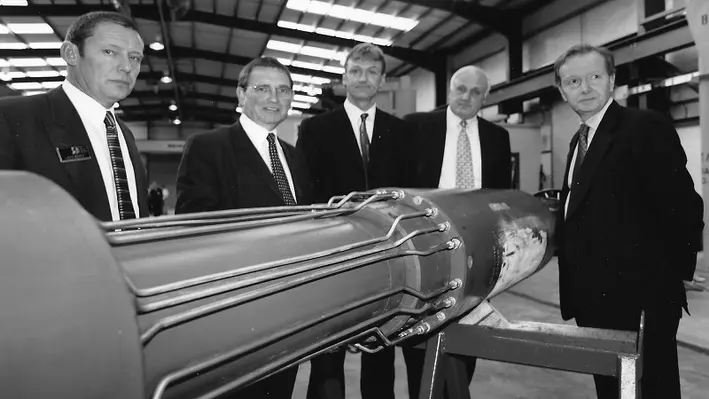
 40 years since the launch of its first subsea test tree system, Expro, a leading energy services provider, has remained at the forefront of subsea landing string technology.
40 years since the launch of its first subsea test tree system, Expro, a leading energy services provider, has remained at the forefront of subsea landing string technology.
The first 10ksi subsea test tree assembly (SSTTA) was created for an exploration and appraisal well project for Hamilton Brothers in the North Sea in 1983. Several of its SSTTA technologies have been on a first to market basis and have helped to progress the sector’s capabilities over the years. Expro has now undertaken more than 3,000 subsea deployments in exploration and appraisal, completion, and intervention applications, and remains a global leader in large-bore SSTTA solutions.
Other subsea well access major milestones Expro has achieved over the years have included the introduction of the first 7 3/8” 10ksi horizontal tree completion landing string system; the launch of the industry’s first 6 ¾” high debris SSTTA system; the release of the first large bore 6 ¾” 10 ksi subsea electro hydraulic control system; unveiling the first 6 ¾” 10ksi dual bore and mono-bore subsea test tree offshore; revealing the first 15ksi 6 1/8” horizontal tree SSTTA and electro-hydraulic control system; and the development of 7 3/8” 10ksi high debris SSTTA.
The evolution of subsea test tree assemblies has allowed the company to expand into the open water well intervention market through the introduction of both riser-based and riser-less well intervention solutions. Such success and dedication to subsea well access application even earned the company the accolade of Intervention Champion of the Year at the recently-held OWI Global Awards 2023.
At the company is showing no signs of building on its successful history. In a bid to continue this history, it has sought to boost its subsea capabilities by acquiring PRT Offshore, the only company to offer a complete Hook-to-Hanger solution enabling comprehensive well completions, interventions, and decommissioning services from surface to subsea. The acquisition enables Expro to expand its portfolio of cost-effective, technology-enabled services in the North and Latin America region and accelerate the growth of PRT Offshore’s surface equipment offering into the Europe and sub-Saharan Africa and Asia Pacific regions.
“At Expro, we’ve been first to the market with many of our subsea test tree assembly products and, as future technical challenges arise, we believe that with our customer-bespoke solution philosophy, we’ll continue to be at the top of the subsea test tree application,” remarked Graham Cheyne, Expro’s Vice President of Subsea Well Access.
“From starting in 1983 supporting operators in the Norwegian North Sea, we’ve become a global player in all parts of the world, supplying fully integrated technologies and services from surface to seabed – the hook to hangar concept. The subsea test tree market operates in the full well lifecycle – from exploration and appraisal through to abandonment and decommissioning while continually looking to improve our delivery and operational performance, and service quality to our global client base.
"Whilst leading in this market for over 40 years with many first to market technologies we are committed to delivering the new technology requirements of tomorrow in order to meet our customer needs whilst maintaining the high level of service quality and customer care.”
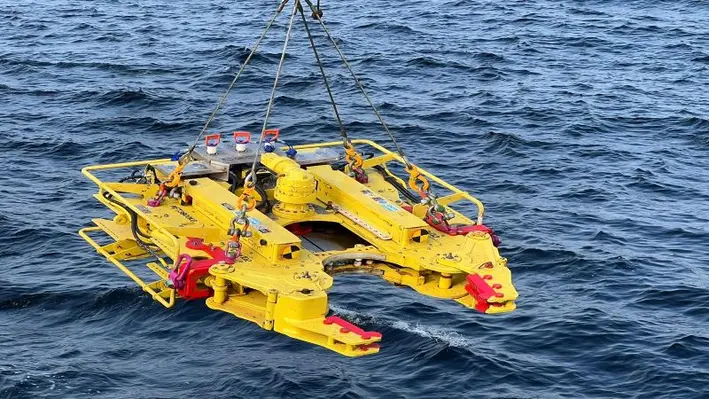
 Decom Engineering’s specialist cutting technology has been successfully deployed on a decommissioning project in West Africa.
Decom Engineering’s specialist cutting technology has been successfully deployed on a decommissioning project in West Africa.
The C1-24 chop saw was deployed in water depths of up to 1,050 m as part of an operation to recover a jumper connector on behalf of Total Energies in the Gulf of Guinea, offshore the Democratic Republic of Congo.
The work scope included the cutting of the insulated 6” Duplex flowline at each end of the jumper, with the chop saw deployed by ROV with hot stab capability, and using a Tungsten Carbon Tip blade.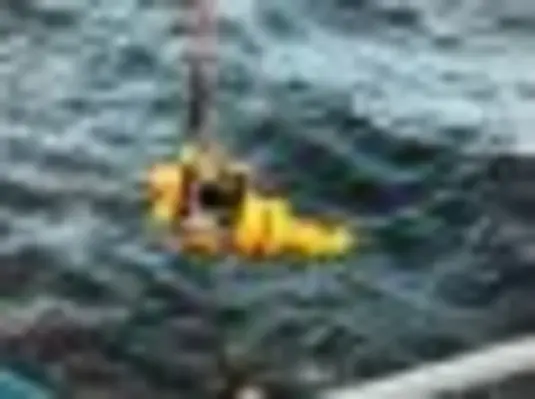
The C-1 chop saw range is certified for use in water depths of up to 2,000 m, and has multiple buoyancy options, hot stab integration, blade reverse capability and bespoke customisation capabilities.
The Congo project follows other successful work scopes on behalf of major oil and gas operators and contractors covering the North Sea, Mauritania, Norway and the Gulf of Thailand.
Decom Engineering Managing Director, Sean Conway, said, “Our latest project in deep water offshore Democratic Republic of Congo is another tick in the box for the versatility, safety and efficiency of our cutting technologies, adding to an extensive trace record of completed work scopes in the major hydrocarbon producing regions.
“Decommissioning redundant piping infrastructure or repurposing asserts to be converted for low or zero carbon energy storage is a massive global market, and we are committed to investing in research and development to ensure our clients have the most sustainable means at their disposal to address their needs.”
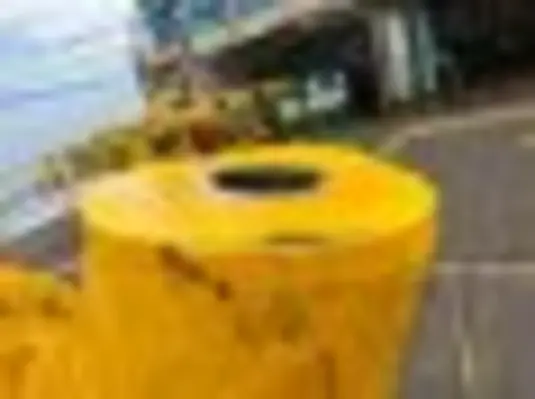
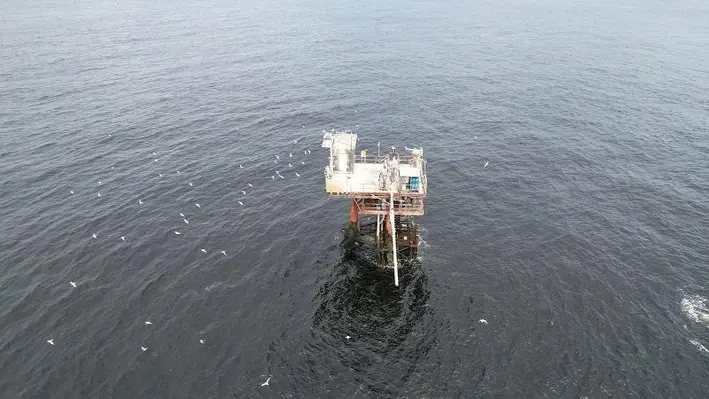

Saab Seaeye, a leading underwater e-robotics company, is assisting in the decommissioning of an oil platform in Angola – the first to undergo this work in the country.
EQS, an environmental quality services company, is leading the project with help from a Saab Seaeye Falcon underwater robot that has been deployed to help transform the platform into an artificial reef.
Chief Technical Officer at EQS, Carlos Rodrigues said, “By operating the Seaeye Falcon and all its related capabilities, EQS is supporting its aim to fulfil specific works in a safe and cost-effective manner delivering accurate and relevant information.”
The Falcon is assisting in the survey and mapping of all underwater components, including checking the wellhead, pipelines and the surrounding maritime environment.
Baseline environmental conditions are determined by taking water and sediment samples at several stations and at different depths, focussing on biological matter, namely zooplankton, phytoplankton, and benthos.

Significant marine growth already exists throughout the structure with abundant marine life already in the area for populating the rig when toppled on its side to become an artificial reef. Once decommissioning is complete, a series of surveys will be scheduled to monitor the evolution of marine growth on the newly created reef.
EQS selected the Seaeye Falcon for its ability to handle an array of cameras, sensors, tooling and complex data gathering systems that include a digital multi-frequency profiling sonar.
Future work involves clearing an area of fish nets, restoring platform signalling and marking, positioning of signal buoys and confirmation of pipeline locations along with the surveys to monitor marine growth.
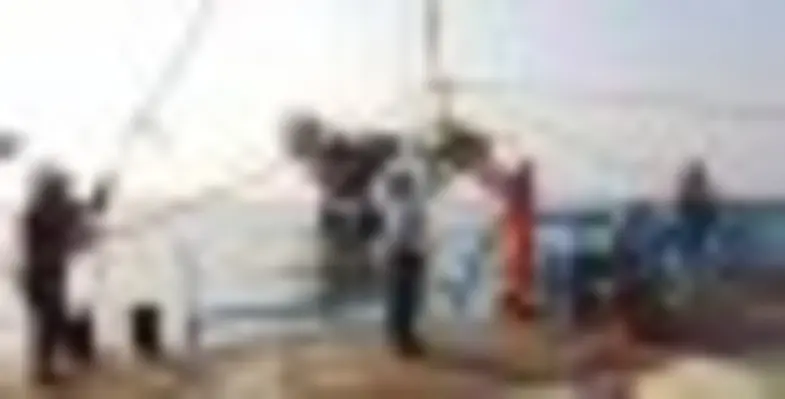
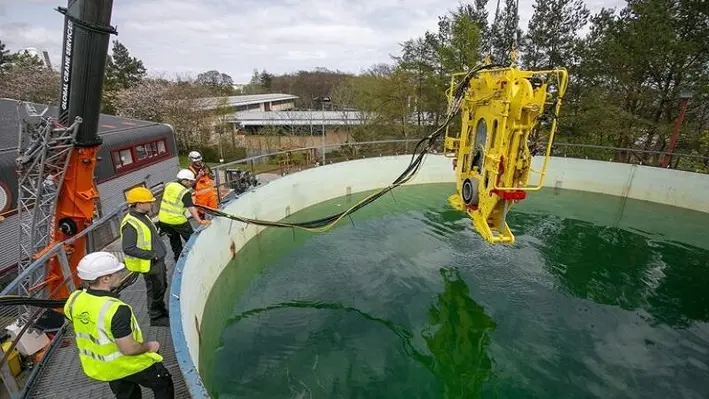

Following its success in the Gulf of Thailand, Decom Engineering (Decom) has secured two contracts worth more than UK£300,000 in the North Sea and offshore West Africa, strengthening their reputation as a leading provider of decommissioning services.
The northern Irish company had designed and developed a range of cold cutting saws which are deployed on a variety of energy sector decommissioning projects which require pipelines and associated infrastructure to be safely removed.
The UK Continental Shelf contract is a conductor recovery and removal project deployed topside on a vessel and Decom’s C1 Chopsaw is expected to complete eight cuts on behalf of a global offshore contractor. Separately, Norwegian-headquartered subsea and offshore wind farm contractor Havfram have commissioned Decom to carry out cutting operations on a ROVCON connecter in water depths of up to 800 metres off the coast of West Africa.
Both projects were secured following a series of technical trials at JFD Global’s testing tank and the National Hyperbaric Centre in Aberdeen, and they follow the successful completion of two phases of another international workscope offshore in the Gulf of Thailand in which Decom’s chop saws performed hundreds of cuts on piping of up to 16” diameter.
Decom Engineering Managing Director, Sean Conway, commented, “The successful completion of a strategic project offshore Thailand and our imminent mobilisation on workscopes in the North Sea and Africa, demonstrates that our technology is gaining traction with energy companies and contractors who have technically challenging requirements on a range of international decommissioning projects.
“Recent technical trials in Aberdeen have proven our cutting technologies can operate safely in deeper waters and that they are preferable to rival solutions where accessibility to subsea infrastructure is an issue.
Steven Gibson, Senior Engineer with Havfram during testing, remarked, “The potential of Decom’s saw to cut the heavy grade material we are going to be cutting through on the West African seabed, the speed of the cut, and the ability to position it in a very restricted space, were the driving factors in awarding this workscope.”
Decom opened up a new base near Aberdeen at the start of 2022 to be located closer to potential North Sea clients and the policy appears to be paying off following this most recent contract award.
Conway added, “We will continue to invest in infrastructure and to build our asset portfolio to ensure we are positioned to be able to respond to more technically challenging projects as the global decommissioning sector continues to grow.
“Our R&D and engineering teams are currently working on new chop saws which are capable of handling piping of up to 36” diameter in anticipation of potentially winning other contracts in the second half of this year.”
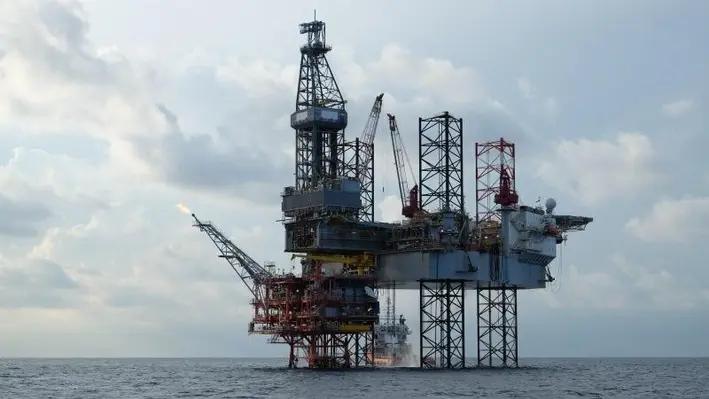
 Petrofac, one of the leading providers of services to the global energy industry, has grown its presence in Africa having been selected by Tullow Oil to provide well decommissioning services in Mauritania.
Petrofac, one of the leading providers of services to the global energy industry, has grown its presence in Africa having been selected by Tullow Oil to provide well decommissioning services in Mauritania.
The contract, with a potential total value of more than US$60mn, involves the project management, engineering, planning and plugging and abandonment (P&A) of seven subsea wells on Tullow Oil’s Banda and Tiof fields.
Petrofac will assume responsibility for the subsea well decommissioning scope from Maersk Decom, who have been preparing the work since 2020. By mutual agreement, the parties have novated the contract to Petrofac who will take immediate responsibility for the project, with the offshore scope running from the fourth quarter of 2022 throughout first quarter of 2023.
Petrofac said it will provide all personnel, assets and equipment required for the project, including management of the ‘Island Innovator’ drilling unit and offshore support vessels.
Nick Shorten, Chief Operating Officer for Petrofac’s Asset Solutions business said, “The contract award is a demonstration of the international demand that exists for the skills and quality of delivery we have established in the North Sea. Since 2016 Petrofac has delivered three successful decom campaigns for Tullow Oil. We look forward to emulating this success for them in Mauritania, and across the African continent as we continue to grow our business here.”
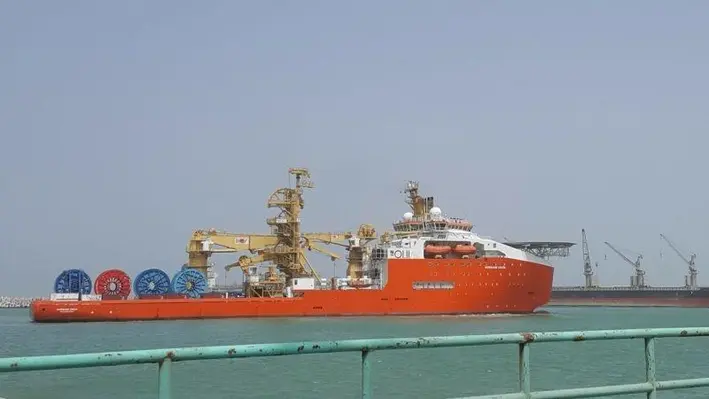

Havfram, a Norwegian oil field equipment supplier recently announced that PC Mauritania 1 Pty Ltd, a wholly-owned subsidiary of PETRONAS, has awarded Havfram an offshore decommissioning contract.
The contract includes the provision of engineering, procurement, retrieval and disposal (EPRD) services for the abandonment and decommissioning of Subsea Facilities at Chinguetti and Banda Fields, offshore Mauritania, in March 2022.
“The PETRONAS Chinguetti and Banda EPRD project is another significant project award for Havfram in the Africa region. This is one of four projects Havfram has been awarded in Africa and the Mediterranean in the last 12 months, further enhancing our already strong track record in the region. We are proud to have been chosen by PETRONAS to meet their decommissioning needs in this field,” said Odd Strømsnes, CEO, Havfram.
Under the contract, Havfram will utilise its in-house expertise to project manage, engineer, retrieve and dispose of the remaining field infrastructure, having already executed the first phase of decommissioning operations in 2018.
“Our focus on risk mitigation and efficient execution solutions has seen us selected by Petronas once again as the perfect partner for decommissioning operations,” said Kevin Murphy, EVP Subsea and Deputy CEO, Havfram. “Havfram has consistently delivered a range of subsea projects across the continent for our clients, and we look forward to renewing our working partnership with Petronas’ Chinguetti and Banda team.”
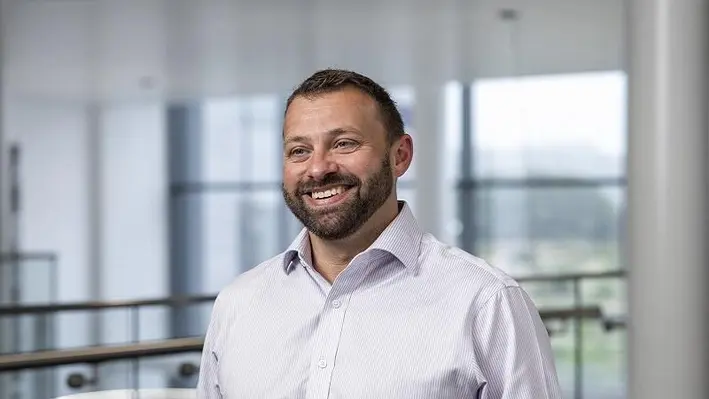

Senergy Wells, a Vysus Group company, has secured 15 new contract wins in wells disciplines globally, stretching from Mexico, through Europe and Africa to southeast Asia.
The contracts, worth more than UK£5mn to the company, include a range of projects with numerous customers, including Energean, Repsol, Shell, Chevron, TAQA and Harbour Energy UK.
To support the breadth of international projects secured, Senergy Wells has embarked upon a recruitment drive to bolster its expertise across services from exploration to decommissioning.
Matt Rothnie, SVP Senergy Wells & ModuSpec, commented, “We are naturally delighted to have secured such a wide range of contracts to deliver projects across the world for a range of customers from energy independents to super majors and NOCs. It’s also encouraging that the type of work covers the complete spectrum of the asset lifecycle from wildcat exploration and front end engineering, through field development, well construction and design, and ultimate decommissioning.
“This positive start to 2022 comes as we bring back the Senergy name. Vysus Group is extremely proud of its heritage and the legacy companies which give us our unique breadth of deep domain expertise. Our experience in the well engineering, operations and project management sector originated within Senergy – and this is a name still instantly recognisable by many in our industry as a service provider and trusted partner for well operators. It’s not just what we do but importantly how we do it, how we show up for our customers. That is why we’re bringing it back.
“The calibre of projects we are supporting this year is fantastic and testament to the proven technical delivery of our team. We look forward to continuing to help our global customer base deliver efficient operations throughout 2022 and beyond.”
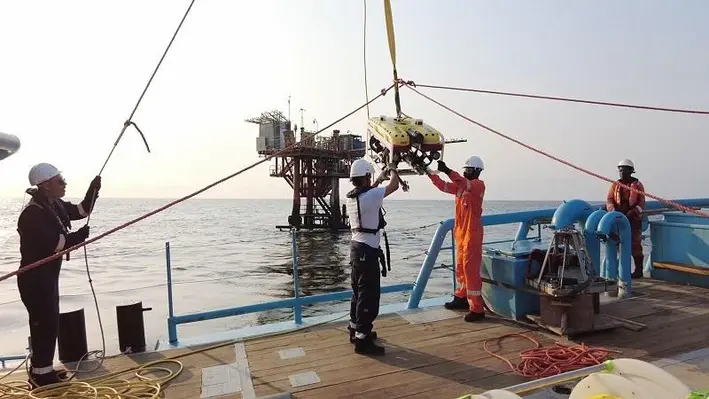

Environment Quality Services (EQS) has successfully assisted in a decommissioning project offshore Angola. Dubai-based EQS deployed their Saab Seaeye Falcon to assess the integrity of the offshore structures via visual inspection and image gathering.
Carlos Rodrigues, CTO, of EQS, commented, The Falcon supports EQS in their aim to fulfil specific works in a safe and cost-effective manner by delivering accurate and relevant information.”
Rodrigues said that the Falcon is an ideal resource for specialist work as it can handle an array of cameras, sensors, tooling and complex data gathering systems that can easily be added or changed thanks to the Falcon iCON intelligent module- focused distributed control architecture.
The Falcon is the top selling robot of its class and its success is attributed to it being a portable, metre-sized, intelligent, powerful highly mahneuverable, easy-to-use vehicle with a depth rated range to 1,000 metres.
It has a reliability record covering more than one million hours underwater, including deep tunnel work. The Falcon can remain stable in turbulent waters and strong currents whilst undertaking both robust and precision tasks.
The structures inspected on the platform offshore Angola included the platform (jacket), well head, protection dome, pipelines and umbilical. EQS helped the offshore energy clients navigate the complex environmental regulatory landscape to achieve compliance as well.
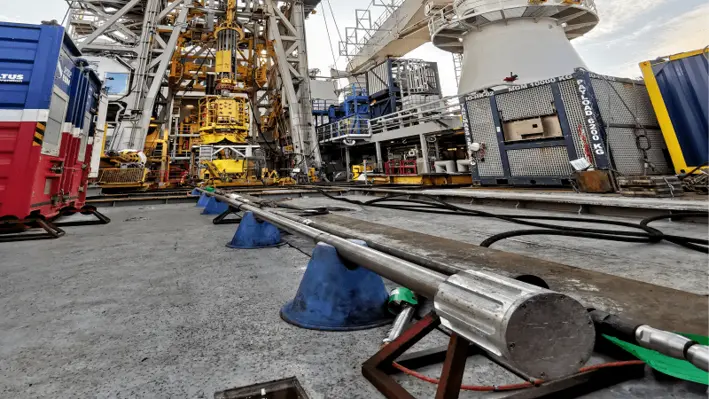
 At the Offshore Well Intervention West Africa 2021 conference, Todd Parker, CEO of Blue Spark Energy, explained how his company has developed a technology to utilise rapidly compressed, low-energy pulses to clear impediments in wellbores.
At the Offshore Well Intervention West Africa 2021 conference, Todd Parker, CEO of Blue Spark Energy, explained how his company has developed a technology to utilise rapidly compressed, low-energy pulses to clear impediments in wellbores.
Since its first operation in 2011, Calgary-based Blue Spark Energy has focused on the electrification of intervention processes, including a new wireline tool that utilises compressed energy to generate a pulse for use in well intervention applications.
BlueSpark Technology utilises high-pulsed power by compressing electrical energy to create high power events. Abandoning the traditional use of power in well bore solutions, Blue Spark's solution reduces the amount of time energy is utilised in, thus increasing its output. As energy is further divided among smaller increments of time, power outputs become significantly larger.
The wireline solution utilises apprxoimately 1 kilojoule of energy compressed into a millionth of a second. This means that every time a tool is used, around 200MW is generated in a power pulse- manifested in a shockwave that can clear impediments, scale, organic materials or blockages. As well as impediment clearance, the wireline tool can be used for production stimulation.
Coaxial cables are often used for this application, with an external energy source supplying approximately 1 kilojoule (around two mobile phone batteries worth of power for an entire treatment).
Involving only a coaxial cable and power source, the solution has practically zero environmental impact, and offers a low-cost and low-footprint intervention compared to alternative methods, tackling several downhole challenges in wellbores.
Blue Spark Energy began its first operation in September 2011 and in that time it has been building up a track record to show the market that this is an effective and trustworthy tool which can solve a number of problems in the wellbore. Since 2011, the company has implemented more than 600 operations worldwide for more than 50 different companies.
Parker explained that of these 600 operations the company has acquired data from 267 oil wells. Of these, there was an average oil production increase of 262%. BlueSpark also collected data for 45 injection and disposal wells and the average change in production was a staggering increase of 413%.
In addition to being an effective tool for any type of well (including some applications within the geothermal space) Parker noted they have been working with some companies in their decommissioning operations. In this regard, the BlueSpark tool can be used for cleaning the casing prior to setting a barrier to improve the chance of it setting and sealing. This can reduce well abandonment costs by as much as 60% in complex cases and at least 20% in simpler cases.
Parker noted, “We are continuing to innovate and improve this technology. We think it is an excellent technology. This is a go-to solution and has a high degree of reliability in removing impediments affecting wellbore performance. We are now accepting more and more orders for it and we have multiple projects on the go today.”